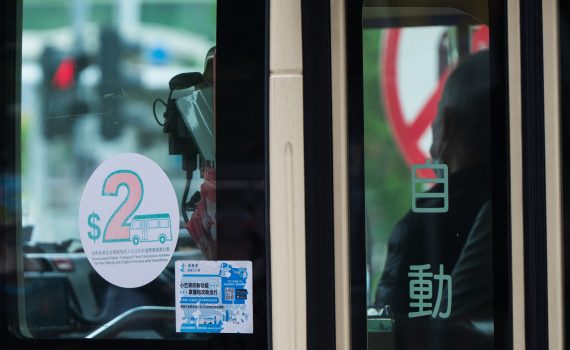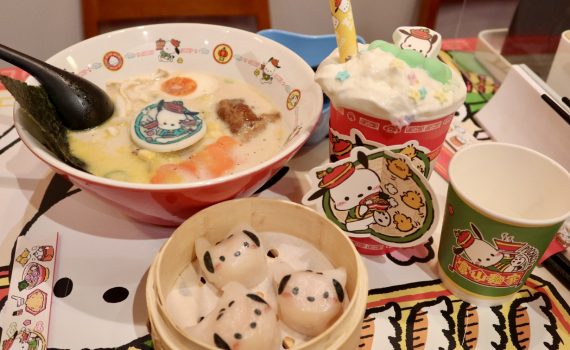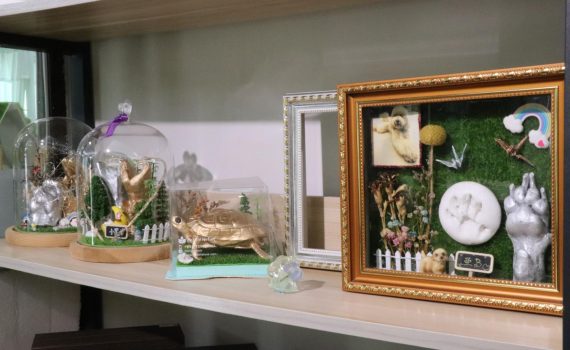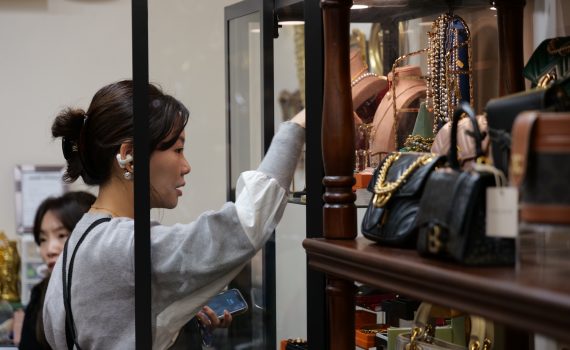TOP STORIES
Budget 2025: Waste-to-energy scheme and electric taxis in Green City plan
- 2025-02-26
- Society
- The Young Reporter
- By: CHEN Yongru、LIN XiaoyouEdited by: Lok Tung LAU
- 2025-02-26
Hong Kong Financial Secretary Paul Chan Mo-po announced this morning a plan to get rid of Hong Kong’s landfills. “I·PARK1”, the first waste-to-energy facility for treating municipal solid waste, will be commissioned this year. A second major facility, “I·PARK2”, is up for tender. Once completed, “I·PARK2” is expected to treat 6,000 tonnes of municipal solid waste per day. This year's Green City proposals also include fare reduction and recycling, green transformation of public transport, and smart green mass transit systems. To enhance waste reduction from the source, Chan said the government will allocate an additional HK$180 million to increase the number of smart food waste recycling bins and food waste collection facilities in residential buildings across Hong Kong, expand the recycling network, and increase the amount of waste collected. According to the Environmental Protection Department, “I·PARK1” advanced incineration technology, combined with mechanical sorting and recycling facilities to recover resources from municipal mixed waste and convert the generated heat into electricity, reducing pollutant emissions “Hong Kong is in urgent need of facilities such as I·PARK1 and I·PARK2 in order to convert waste into energy,” said Tsou Jin-yeu, the Founding Committee Member of the China Green Building (Hong Kong) Council. Leung Yee-tak, Chairman of the Asian Intelligent Building Association, said construction waste is still a problem. “Ash produced after incineration, including bottom ash and fly ash, needs to be properly disposed of.” Leung said. “At present, there is excess capacity of building materials in the mainland, the demand for furnace bottom ash is not high, and the treatment technology of fly ash is not mature.” “Although the facility is capable of generating electricity, the incineration process can still produce pollutants, so it needs to be strictly controlled,” he said. “Another key point to achieving energy saving is the user. The government should …
Budget 2025: HK$2 transport subsidy scheme capped at 240 trips a month
- 2025-02-26
- Society
- The Young Reporter
- By: LEUNG Chi Ngai、YAM Long Hei JamieEdited by: Chun Lim LEUNG
- 2025-02-26
Passengers of public transport over 60 years old will have their HK$2 rides limited to 240 trips per month, Financial Secretary Paul Chan Mo-po proposed in this year’s budget speech. For trips below HK$10, eligible passengers will continue to pay HK$2, but for trips costing more than HK$10, they will have to pay 20% of the total fare. The updated scheme preserves the policy intent while striking a balance on “enhancing the sustainability of the scheme and minimising the impact on the beneficiaries,” said Chan. Government reimbursements to public transport operators is estimated to hit a record high of HK$5.4 billion in 2025-2026, more than tripled compared to HK$1.4 billion in 2021-2022, according to government figures. Currently, the HK$2 subsidy scheme which allows all permanent residents over 60 years old to take public transport for two dollars per trip comprises 0.7% of the total government recurrent expenditure. Dai Fung-wa, 80, who lives in Mei Tin Estate in Tai Wei, said the new policy is unfair to people over 70 years old. Dai said people between 65 and 70 years seldom take public transport after retirement. “You can still work in your 60s, but if you are over 70, you can only take care of your grandchildren at home,” Dai said. Government figures show that 49.4% of residents aged between 60 and 64 years were in the labour force in the past three months, compared to 13.7% of those over 64 years old. Government expenditure on the HK$2 scheme is more than doubled in 2022-2023 from HK$1.4 billion to HK$3 billion, when the eligibility age was lowered from 65 to 60, with extended coverage to include red minibuses, kaito ferries and trams. Lam Chun-sing, Legco member for the Federation of Hong Kong and Kowloon Labour Unions said subsidising transport for …
Budget 2025: Government proposes fiscal consolidation measures to cut expenses
- 2025-02-26
- The Young Reporter
- By: NG Natasha Goa Sheng、MAO AnqiEdited by: CHAN Wing Yiu
- 2025-02-26
The government has proposed to cut 7% of government recurrent expenditure from now to the 2027-2028 fiscal year, Financial Secretary Paul Chan Mo-po said in the budget address this morning. A “reinforced version” of the financial consolidation programme is coming soon, with the purpose of restoring HK$6.2 billion of expenditure over the next five years. “Strictly containing public expenditure is a must, but we should proceed in a steady and prudent manner and be careful to find a balance among the various impacts that may arise in the process,” Chan said. In the 2024-2025 fiscal year, Hong Kong recorded a deficit of HK$87.2 billion, 60% higher than the forecasted deficit of HK$54.4 billion last year, according to the government. In this year’s budget, the total estimated expenditure stands at HK$639.7 billion, an increase of 2% from the previous year. Terence Chong Tai-leung, Professor of economics at the Chinese University of Hong Kong, said Hong Kong’s economic performance is not as bad as widely perceived. “Hong Kong’s financial expenses have always been stable. It is normal to observe deficit fluctuation throughout the business cycle,” he said. To reduce the deficit, Chong suggested the government can work on land sales and budget upper limits. “I suggest further dividing large areas of land into smaller ones, and then selling more of them to small- and medium-sized enterprises and overseas companies, instead of strengthening the local monopoly,” he said. Other proposals to reduce expenditure include increasing the rate of reduction of recurrent government expenditure from 1% to 2% in 2025-2026, under the premise of not affecting Comprehensive Social Security Assistance, Social Security Allowance and other statutory expenditures. The policy will be extended to 2027-2028 and is expected to save the government around HK$3.9 billion, HK$11.7 billion and HK$19.5 billion in the following three financial …
Themed restaurants offer new experiential consumption culture
- 2025-02-24
- Society
- The Young Reporter
- By: ZHOU Yun、LIN XiaoyouEdited by: CAO Jiawen
- 2025-02-24
At Ramen Iroha, a cartoon dog co-branded theme restaurant in Causeway Bay, Iris Lee, 20, takes pictures of the dishes and shares them on Instagram. “I’m a fan of Pochacoo,” Lee said. “I come here not just because the ramen is delicious but to experience being surrounded by lovely Pochacoo.” All the decorations in Ramen Iroha are filled with Pochacco elements, including the food itself. Soon after its launch in December 2024, an Instagram post on Ramen Iroha went viral, attracting long lines of customers. Cyrus Lin, 37, the founder of Ramen Iroha, said during the peak hours, consumers may have to wait in line for up to three hours. “Today’s consumers attach great importance to the experiential value of their purchases and seek emotional engagement and social interaction with brands,” Lin said. “I love Pochacco, I came specifically to check in after reading the promotion on Instagram,” said Donnie Yu, 27, a bank worker. “I will also share my dining experience on social media.” “In an era dominated by social media, I think sharing unique experiences has become an important consumption trend,” Yu added. “Sharing such experiential consumption experiences satisfies my emotional and social needs.” Ramen Iroha is one of many restaurants that have risen in fame in the city in recent months and co-branded with well-known intellectual property images. Since January, co-branded restaurants such as Kingsley Cafe × Snoopy, Black Wood LZAKAYA × Cinnamoroll, and ABURI EN × Attack on Titan have also been launched. “Along with the growth in the number of such restaurants, there is also a growing demand from consumers for immersive experiences in the catering industry,” Lin said. “Space layout, tableware design, dish placement, and even the service style of employees are all details that need to be improved.” Lin said Ramen Iroha will …
Economic downturn fuels claw machine entrepreneurship
- 2025-02-24
- Society
- The Young Reporter
- By: CHENG Tsz Sen Sean、SIU Tsz HangEdited by: Wing Chi HO
- 2025-02-24
Claw machines, once a niche type of amusement, require minimal investment and management to operate, and now they are driving a new wave of entrepreneurship in Hong Kong’s bustling malls amid economic uncertainty. Claw machine arcades can stay open around the clock for which obsessed claw game lovers never have to stop. Recently, these machines have found their way into many shopping malls across Hong Kong, occupying previously vacant shop spaces and offering players a chance to win big prizes, such as a vacuum cleaner or a Nintendo Switch gaming console, for HK$5. The rental index of the Hong Kong retail property market has dropped by over 20 points after peaking in 2019, and the average rent for retail has been decreasing since then, according to the Rating and Valuation Department. Despite the fall, many commercial spaces remain vacant and claw machine arcades have become a short-term solution for both landlords and business starters. Anyone who can afford the rent, the machines and the prizes can open a claw machine arcade, as they require minimal staffing and maintenance. Alan Tang, 30, owner of a claw machine arcade in Yuen Long said all the machines in his shop were rented out in 2020, but only 60% of them are rented out now. His monthly income peaked at nearly HK$100,000 in 2020, but since then Tang has seen a 60% drop in revenue. As of the beginning of this year, machine rent ranges from HK$3,500 to HK$4,500, a 25% decrease from 2020. By comparison, fewer machines are being rented out. “Claw machines require little management, more people are joining this business as it brings a decent amount of profit,” Tang said. Tang added that the monthly rent for his store is about HK$50,000. Operating 24 …
Private shoppers face uncertain future in shifting consumer market
- 2025-02-24
- Society
- The Young Reporter
- By: Ruoyu LI、CAO SiyuanEdited by: Cheuk Chi Maggie YEUNG
- 2025-02-24
Holding bags of pastries from the well-known mainland bakery brand, Bao Shi Fu, 32-year-old housewife Li Lanlan, a Shenzhen resident, starts her daily routine. She prepares to deliver goods from Shenzhen to Hong Kong, ordered by Hong Kong customers, at Futian Port. “Daigou” are personal shoppers who take orders directly from customers, make the purchases for them and deliver the goods to them, all for a commission fee. Li started her daigou business right after the Lunar New Year, and is already getting a steady stream of orders, usually three to four orders a day. “As a housewife, I can only schedule one trip to Hong Kong each day to earn some pocket money,” Li said. A few years ago, daigous mainly purchased high-end goods such as milk powder in Hong Kong and brought them to the mainland. As consumption habits change, the trend is reserving. Nowadays, many daigous takes orders through social media, many of them delivering food or daily necessities directly from Shenzhen to Hong Kong. Hong Kong Immigration Department figures show that more than 81 million headcounts made the crossing between Shenzhen and Hong Kong last year. “As more people went to Shenzhen to spend their money, some people found it profitable to help deliver goods via ports, and there are plenty of accounts on RedNote doing reverse daigou,” said Li. People use social media platforms like RedNote and Facebook to find agents and place orders. These agents deliver the shopping to Hong Kong at agreed-upon MTR stations. Li usually earns around HK$200 to HK$300 a day. “If the client requires home delivery, I will charge HK$600 to HK$1000 for a single errand, depending on the distance,” said Li. "Some customers are quite generous with the delivery fees, especially for home delivery services. I once …
The cost of bidding farewell to pets
- 2025-02-23
- Society
- The Young Reporter
- By: CHEN Yongru、TANG SiqiEdited by: WANG Jing
- 2025-02-23
Wong Lam lost her 12-year-old pet dog named Peach in January. “Peach is irreplaceable to me and I wanted to have a proper remembrance,” Wong said. She considered spending on a “Life Crystal” souvenir, a keepsake made from dead pet's ashes and fur. But the hydration process alone would cost HK$800 to 900. After hesitating for a long time, she decided to buy a simple urn with two animal paw prints for HK$800. “My budget was only about HK$2,000,” she said. In 2018, about 242,000 households had cats and dogs, according to government figures. It is an increase of almost 40% since 2005. Burying dead animals in public places is against the law. In this case, pet owners can choose to leave it to the government or go to a specialised agency that charges more expensive fees. The Food and Environmental Hygiene Department transport animal carcasses collected in plastic bags and bury them in landfills. Pet owners who can afford the higher cost may choose to have their pets institutionalised as they feel this will allow their pets to depart this world in a more dignified manner. Mathew Wu is the owner of Pet to Nature, Hong Kong's first hydration hospice for pets. He said although more young people are coming to the shop, they are becoming more “rational” in consumption compared with five years ago. “Business used to be good and people were willing to spend money,” said Wu. “Maybe it's the economic environment now, fewer people are willing to buy souvenirs.” Iris Chan, the owner of Pet Memorial, a high-end pet hospice, said that the importance Hong Kong people place on their pets has increased in recent years. “Most people regard their pets as family members,” she said. “ Some families even come together to see it off." …
Hongkongers' northbound dental journey to better smiles
- 2025-02-23
- Society
- The Young Reporter
- By: ZHONG Xinyun、CHEN XiyunEdited by: YANG Haicen
- 2025-02-23
A typical weekend for Wan Jiachen begins with a 40-minute subway ride through the bustling Futian Port, heading to the Shenzhen Second People's Hospital to get a check-up on his latest dental fillings. “Dental service in Shenzhen is my first choice,” said Wan. He is a bank worker with a Shanghai household registration (hukou) and a Hong Kong identity card. He now lives in Hong Kong because of his new job. The long journey crossing the border can be exhausting, but Wan said it is worth it. “In Hong Kong, it has become more difficult to secure an appointment with a public dental clinic, and the price is unaffordable for ordinary wage earners,” he said. In Shenzhen, he pays HK$100 to HK$200 for teeth cleaning, but in Hong Kong it’s around HK$800. Wan is not the only Hong Kong resident traveling north to seek dental treatments. According to Shenzhen government figures, in 2023, Shenzhen provided 700,000 cases of medical treatment for Hong Kong residents. Currently, Hong Kong has only 0.37 dentists per 1,000 people, which falls behind many countries worldwide, according to Lo Chung-Mau, the Secretary for Health of Hong Kong. Limited local public and private healthcare resources is a major issue. “The service quality and professionalism vary significantly between clinics,” said Daniel Wong, a 57-year-old local Hong Kong resident. “Hong Kong lacks private clinics. Their small scale is also a problem.” Private clinics also tend to be more expensive. According to the clinic’s price list, Nixon Dental at Mongkok charges HK$6,000 for one-time full mouth root planing. For the clinic’s branch in Central, the same service costs even higher at HK$8,000. According to Hong Kong government statistics, as of December 31, 2023, Hong Kong has 2,876 registered dentists, with around 700 working in the public sector. “The scarcity of …
Luxury bags and wedding gowns lead the rental fashion craze
- 2025-02-23
- Society
- The Young Reporter
- By: XU Jingyi、ZHENG XinyiEdited by: WANG Ludan
- 2025-02-23
Cici Fan, 21, a university student, darts between various luxury handbag stores in Tsim Sha Tsui after receiving a last-minute notification to attend an important business dinner. She paced and occasionally looked inside from the shop window. Finally, she entered a store and secured a Dior handbag for HK$800. “I finally feel at ease because it solved my problem of not having enough money to buy a fancy tote bag for a dinner party,” Fan said. But from the moment she walked out of the store, she had to carefully look after the bag until it was safely returned to the store because it was rented. Fan is the small epitome of the Hong Kong clothing rental craze. More Hongkongers have started trying rental services in different boutiques in recent years. Renting clothing and accessories from luxury brands allows consumers to display high-end lifestyles in social settings without spending much money. It provides a cost-effective way for people to keep up with fashion trends. Some overseas luxury rental brands, such as Rent the Runway and Style Theory, are starting to emphasise the local market by offering online services for Hong Kong consumers. Kimi Lee, the owner of the 37-year-old luxury bag rental store Huiyuan, has been running it for six years. He said it was tough for the store to operate in its early days. “Very few people came to try this business at first because most people were not familiar with the concept of renting a bag,” he said. Lee said things have started to look different in recent years. “Now the number of monthly rental orders is more stable at more than 100, and the customer base has expanded from local Hong Kong office workers and fashion enthusiasts to mainland tourists,” Lee said. To satisfy the needs of …
Shenzhen restaurants win Hong Kong diners’ hearts
- 2025-02-23
- Society
- The Young Reporter
- By: FENG Zhenpeng、Li YinhengEdited by: MAO Anqi
- 2025-02-23
On a typical Sunday evening, Jack Kwan from Hong Kong, 32, is waiting to be seated at a well-known hot pot restaurant in Shenzhen. During peak dining hours, crowds gather at the restaurant’s entrance to look at the menu. They wait patiently until their queue number is called. Kwan sips on the chrysanthemum tea, provided by the restaurant for those who are waiting to be seated. “I feel time passes faster when queuing here with tea provided. It is much more relaxing. We do not experience this level of convenience while queuing in Hong Kong,” he said. Kwan goes to Shenzhen to try out different cuisines once or twice a month. After COVID-19, heading north to eat has become a popular trend for Hongkongers on weekends. Shenzhen restaurants often offer lower prices, which attracts more Hong Kong diners and makes them more competitive than restaurants in Hong Kong, especially during weekends and holidays. In 2024, over 52 million Hong Kong residents travelled through Lo Wu Port, one of the 16 border checkpoints connecting the two cities, an increase of 68% compared to the previous year, according to the Hong Kong Immigration Department. Jason Wu, 26, who went to Shenzhen for the first time during the recent Lunar New Year holidays, said the disparities in income and consumption levels in the two cities make cross-border dining a better choice for him. “Hong Kong has a higher wage level and a stronger consumption capacity than Shenzhen, but Shenzhen’s price level is lower than Hong Kong,” he said. Government data shows that the median monthly wage for a Hongkonger was HK$20,500 in 2024. On the ranking of cost of living of cities worldwide, Hong Kong tops the list while Shenzhen ranks 34th, according to Mercer’s report. “I am pretty attracted by the affordable …










